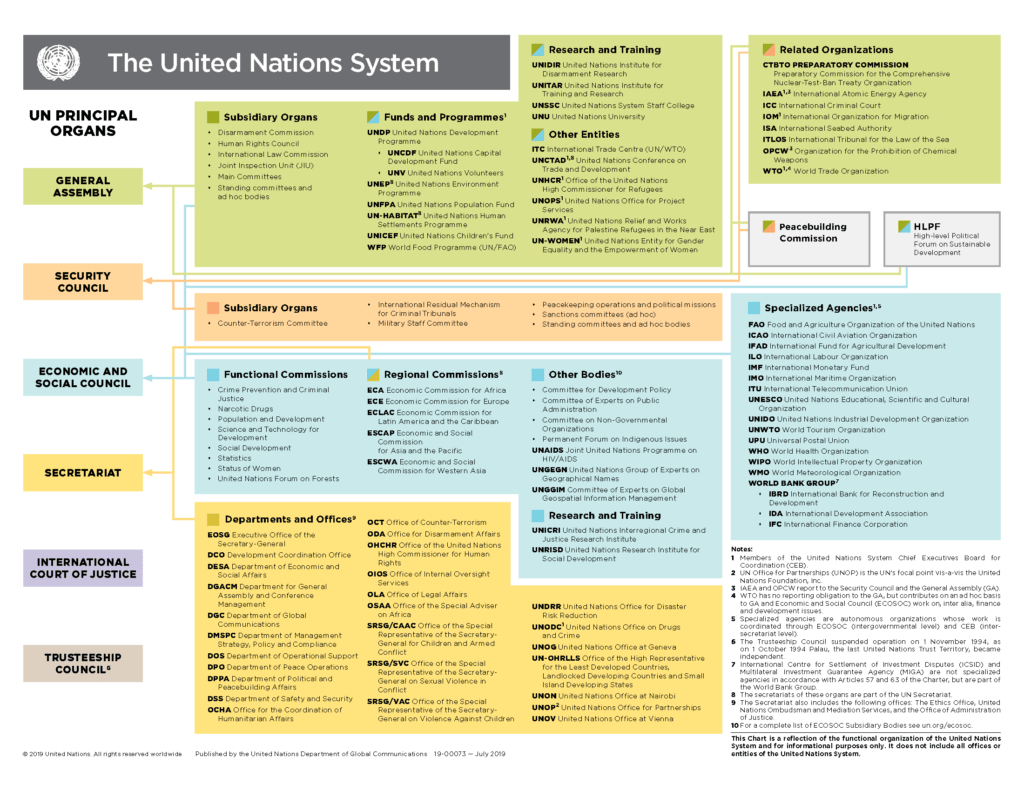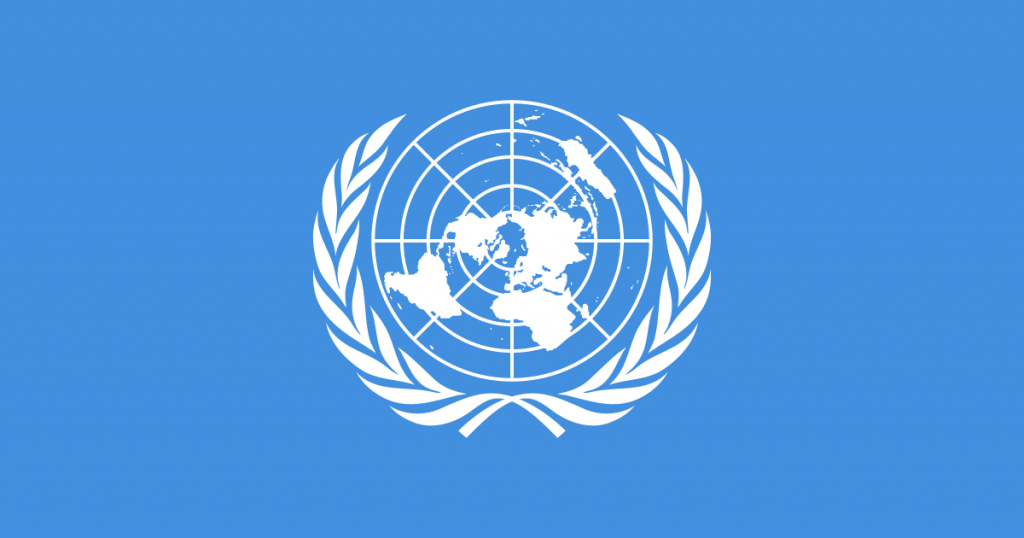
How to get a job with the United Nations and work in the humanitarian sector?
- Guide and tips, United Nations
Table of Contents
What is the UN?
“The United Nations is an international organization founded in 1945 after the Second World War by 51 countries committed to maintaining international peace and security, developing friendly relations among nations and promoting social progress, better living standards and human rights.” (UN)
Now it has 193 member states and employs 41.000 people. The UN has humanitarian, development and political activities.
The official languages used within the United Nations are Arabic, Chinese, English, French, Russian and Spanish.
1. Organs of the UN
The UN is composed of five active organs:
You can find more information on the UN Directory: UNSCEB.
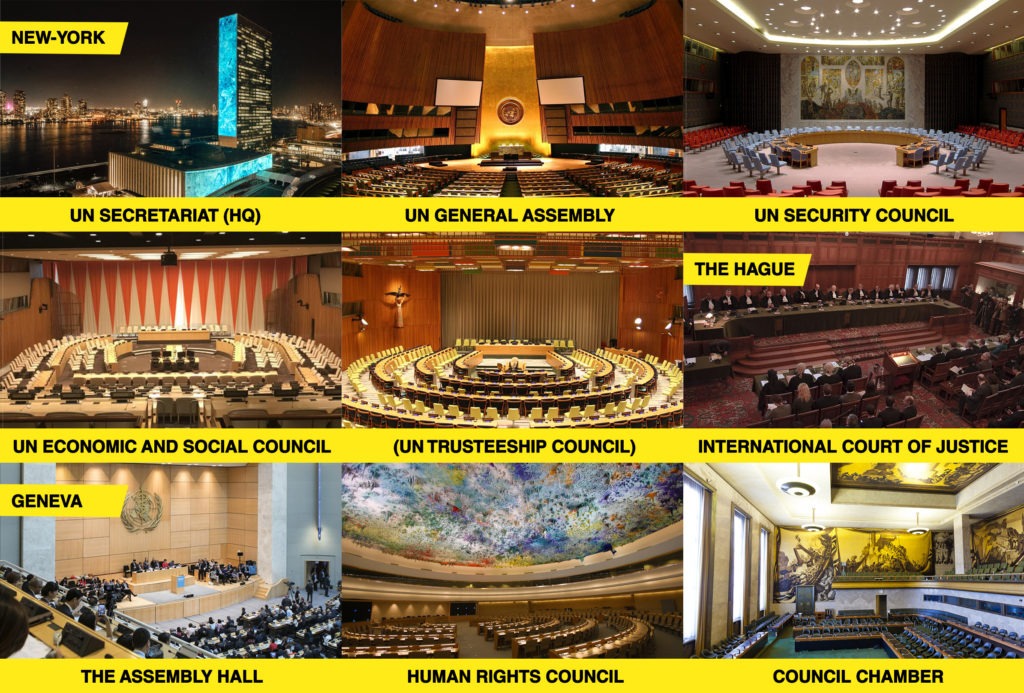
2. Sustainable Development Goals (SDGs) - Agenda 2030
In 2015, the UN presented the 17 Global Goals during the General Assembly. The goal, written on the Agenda 2030, is “to achieve a better and more sustainable future for all”. Each goal has a list of specific objectives to reach. The SDGs became the main framework to follow and promote worldwide. Its simplicity and precision is, for many private and public organisations, a way to decide on clear strategic goals.
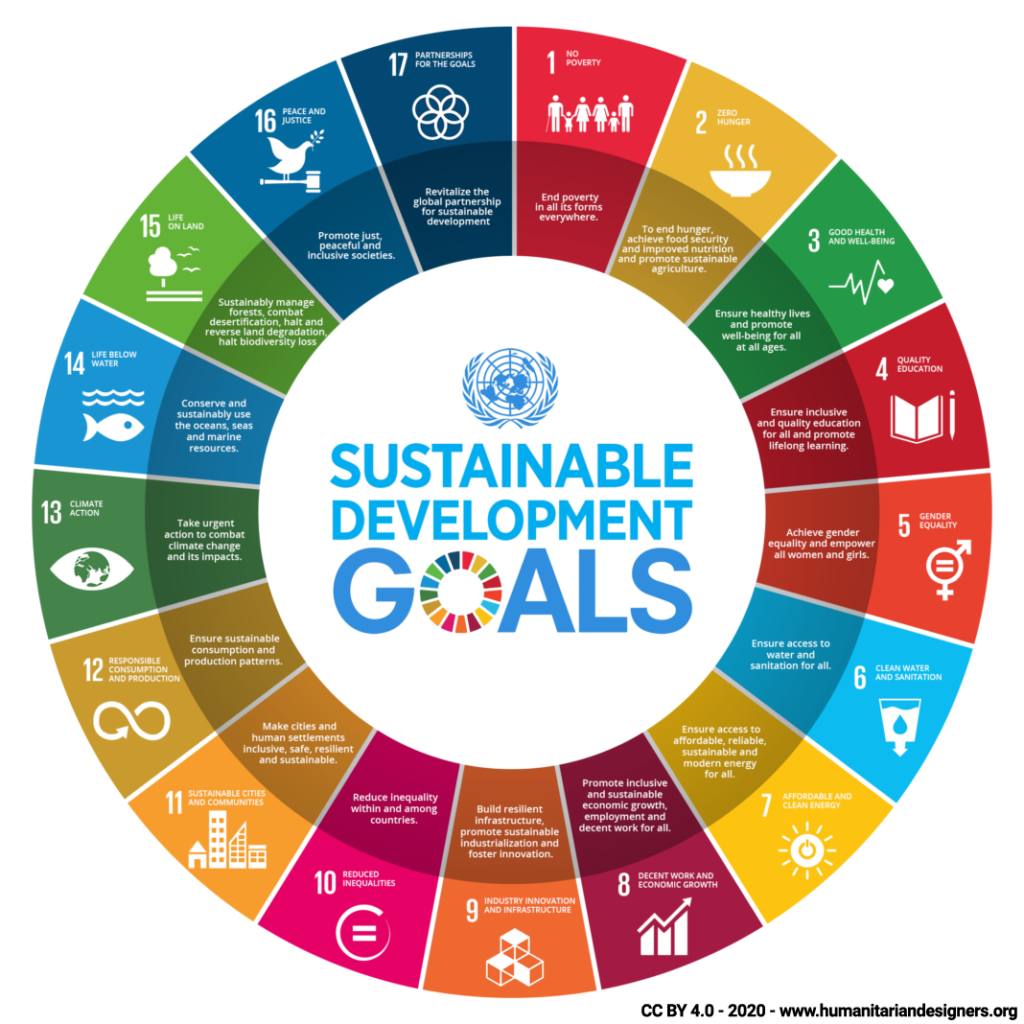
UN bodies with Humanitarian activities
The General Assembly of December 1991 decided that the UN should be better prepared to respond to natural disasters and other emergencies. It resulted in the creation of several actors:
- UN OCHA stands for United Nations Office for the Coordination of Humanitarian Affairs. This UN body is now mandated to work closely with global cluster lead agencies and NGOs to develop policies, coordinate inter-cluster issues, disseminate operational guidance and organise field support. UN OCHA is part of the UN Secretariat.
- The Inter-Agency Standing Committee (IASC) is a forum of UN and non-UN humanitarian partners. Its goal is to improve the coordination of humanitarian responses. It’s a service provided by OCHA.
- The Under-Secretary-General for Humanitarian Affairs and Emergency Relief Coordinator (ERC) heads OCHA and chairs IASC.
Following the Indian Ocean Tsunami of 26 December 2004, resulting in the loss of 228,000 people, major reforms were introduced. The Cluster Approach (image below) was the most ambitious one. It aimed to improve the coordination among humanitarian organisations and mandated UN and non-UN actors to coordinate each cluster.
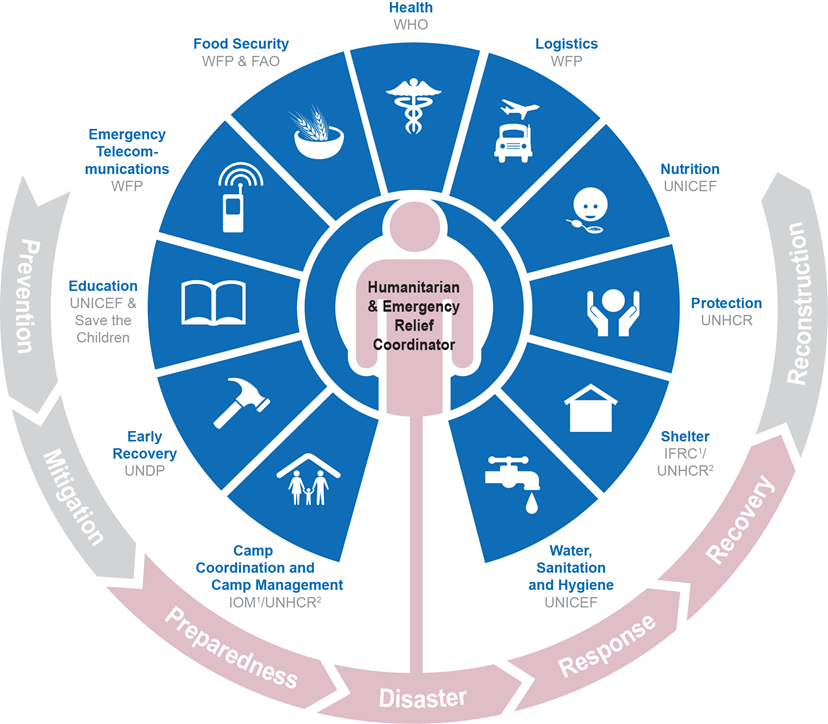
Entry opportunities
The UN requires a strong academic and professional backgrounds including several years of international experience. But its prestige often means that each job offer receives hundreds of applications.
The humanitarian activities is a wide sector. Therefore, there is a large variety of professions among the applicants: people who would like to shift to “a meaningful work” but also people who would like to find an entry point into the UN and its wider political activities.
For a non-design job opportunity, such as “communication specialist”, you will have to compete with people graduated in journalism, international relations, communication, politic, social science, … so, you will have to do the extra-mile of work to be considered as a serious candidate. On the other side, design job opportunities are not so many so you may face less competition than other professions.
The hiring procedure may include “assessments such as written exercises, presentations, technical tests, knowledge-based interview, competency-based interviews or other assessments”. Such a process can last for several months.
1. Recruitment and opportunities
Before to continue, it’s important to introduce the three kinds of applications: specific, generic and roster:
- Specific applications are the most common kind of applications: you apply for a specific job, your application is reviewed, you pass the tests, you’re hired. Most of the time, it will be missions with X months renewable contract.
- Generic applications are targetting a skill rather than a position. They are made to gather a list of qualified candidates, called rosters, that will join a Talent pool for a given duration.
- Once the rosters are on the talent pool, the recruiting services can Recruit-from-Roster whenever they need a specific skill, i.e. “design documents for a specific event”. It allows the recruiter to quickly select qualified candidates. The applicants fill their application only once.
2. Job levels
Large institutions such as the UN use standardised categories and levels to facilitate the recruiting process. These are the different staff categories at the United Nations:
- Professional and higher categories (P and D): internationally recruited professionals and expected to serve at different duty stations.
- General Service and related categories (G, TC, S, PIA, LT): administrative, secretariat and clerical support as well as specialized technical functions such as printing, security and building maintenance.
- National Professional Officers (NO): locally recruited professional level, only in non-headquarters duty stations.
- Field Service (FS): administrative, technical and logistic support with a minimum of six years of experience.
- Senior Appointments (SG, DSG, USG and ASG): political appointment.
All the categories have standardised levels that correspond to your level of experience:
| Years of experience required | Professionals and Directors |
|---|---|
| 0 | YPP (selected countries); P-1 (rare); Internship |
| 2 | P-2 |
| 5 | P-3 |
| 7-10 | P-4 |
| 10-15 | P-5; D-1 |
| 15+ | P-6; P-7; D-2 |
3. Internships
An internship is the most common way to get an entry-level job in the UN. You can find a lot of information online, i.e. Payyourintern.com, Cinfo.ch. Let’s reply to four common questions: the location, the finances, the assignment, and the eligibility.
It’s an uncommon practice to send interns on a hardship duty station, where a conflict or a natural disaster is happening. So, the majority of internships are based in the headquarters of UN agencies, such as New-York, Geneva or Nairobi. It means that most opportunities will happen in a communication or information unit.
When it comes to finances, the UN has been criticized for its unfair internship policy. Indeed, thousands of interns continue to not being paid while doing full-time work for six months. This policy is unfair for the students who cannot afford to work for free. Several UN agencies are now awarding compensations.
The eligibility can be found with the assignment and may change based on the recruiting services. Some may restrict the job application to “people who graduated less than x years ago”, some may not… and some may set the limit but not verify it. It means that you may compete with only young professionals, giving you more chances to be hired.
On the other side, if you graduated few years ago already, IOM seems to be the most open at the moment with a three years limit upon graduation.
4. UN Volunteers
A really interesting paid entry-level position is the UNV talent pool. The calls, published by UN agencies worldwide, have several categories:
- International or National applicants;
- Youths or Specialists. Specialist requires more experience. It is a great entry-opportunity for people who want to shit their career from the private sector to the UN.
UNV requires you to fill your information only once to apply to any job application.
5. UN Volunteers: Online volunteering
The onlinevolunteering.org is probably the only place within the UN job boards where you can find a category called “Art & Design”. This is real volunteering:
- It is non-paid;
- Online volunteering opportunities are short-term and must be no longer than 26 weeks each;
- The recruiter must detail the tasks and time frame on the application. It includes the number of working hours per week.
- The recruiter must contact all applicants to let them know whether or not they have been selected for the opportunity.
- You receive a certificate of appreciation from the recruiter.
We don’t know the number of applications or the hiring process, but it seems an interesting experience to work with the UN.
6. Junior Professional Officer Program (JPO)
The Junior Professional Officer Program offers young professionals (with experience) an opportunity to work in the UN.
This program is financed by the countries individually. Therefore, you will find the job applications on the Ministry of Foreign Affairs of your country. Openings are available only once per year for a short period. Conditions apply.
7. Young Professionals Programme (YPP)
This program applies for young candidates that are from un- and under-represented countries among the UN staff members. Many conditions apply and openings are once a year.
8. Consultants
Consultants are individual contractors commissioned for a limited period for very specific assignments. Therefore, you generally need several years of experiences. You can find the Consultant Roster on the UN website.
Job boards of the UN
The main platform listing all the job applications is career.un.org but the main recruiting platform (where you apply) is called Inspira. We don’t know if the UN agencies are required to use these platforms or not. But, because they all have their own job boards, we decided to list them all.
We advise you to visit the job boards of the agencies that you are targeting because they often provide FAQs and advice on how to best apply. It can become a precious resource on such a competitive sector.
We also advise you to create an account on Inspira and fill in your details, experience, and references. When you will want to apply to a job, you will just have to add your motivation letter. Apply as soon as possible because the procedure is always longer than you would expect.
To name a few more platforms that are listing UN job opportunities: ReliefWeb, ImpactPool, UNCareer.net, UNJoblist.org, and UNchannel.org.
Was this article helpful? Have you applied to the UN? Would you like to have more information on a specific topic? Write to us in the comment or on our social networks!
| Logo | Initials | Name | HQ | Job Board |
|---|---|---|---|---|
| CTBTO | Comprehensive Nuclear-Test-Ban Treaty Organization | Vienna | Jobs | |
 | FAO | Food and Agriculture Organization | Rome | Jobs |
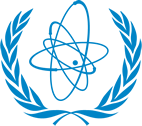 | IAEA | International Atomic Energy Agency | Vienna | Jobs |
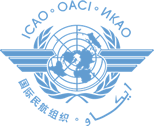 | ICAO | International Civil Aviation Organization | Montreal | Jobs |
 | ICC | International Criminal Court | The Hague | Jobs |
 | ICDDRB | International Centre for Diarrhoeal Disease Research | Dhaka | Jobs |
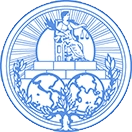 | ICJ | International Court of Justice | The Hague | Jobs |
 | IFAD | International Fund for Agricultural Development | Rome | Jobs |
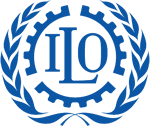 | ILO | International Labour Organization | Geneva | Jobs |
 | IMF | International Monetary Fund | Washington | Jobs |
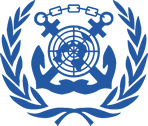 | IMO | International Maritime Organization | London | Jobs |
 | IOM | International Organization for Migration | Vienna | Jobs |
 | IPU | Inter-Parliamentary Union | Geneva | Jobs |
 | IRENA | International Renewable Energy Agency | Abu Dhabi | Jobs |
 | ISA | International Seabed Authority | Kingston | Jobs |
 | ITC | International Trade Centre | Geneva | Jobs |
 | ITC-ILO | International Training Centre – ILO | Italy | Jobs |
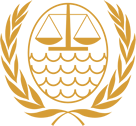 | ITLOS | International Tribunal for the Law of the Sea | Hamburg | Jobs |
 | ITU | International Telecommunication Union | Geneva | Jobs |
 | OCHA | Office for the Coordination of Humanitarian Affairs | Geneva, N.Y. | Jobs |
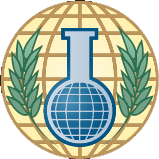 | OPCW | Organisation for the Prohibition of Chemical Weapons | The Hague | Jobs |
 | OSCE | Organization for Security and Cooperation in Europe | Vienna | Jobs |
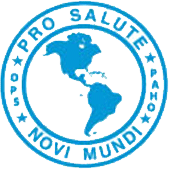 | PAHO | Pan American Health Organization | Washington DC | Jobs |
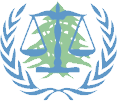 | STL | Special Tribunal for Lebanon | Lebanon | Jobs |
 | UN | United Nations | New York | Jobs |
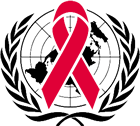 | UNAIDS | UNAIDS | Geneva | Jobs |
 | UNDP | United Nations Development Programme | New York | Jobs |
 | UNEP | United Nations Environment Programme | Nairobi | Jobs |
 | UNESCO | United Nations Educational, Scientific and Cultural Organization | Paris | Jobs |
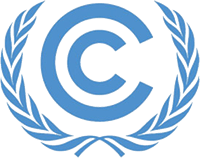 | UNFCCC | United Nations Framework Climate Change Convention | Bonn | Jobs |
 | UNFPA | United Nations Population Fund | New York | Jobs |
 | UN-HABITAT | United Nations Human Settlements Programme | Nairobi | Jobs |
 | UNHCR | United Nations High Commissioner for Refugees | Geneva | Jobs |
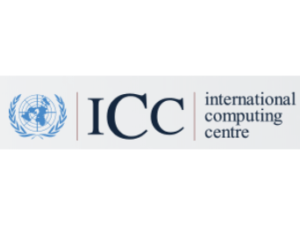 | UNICC | International Computing Centre | Geneva | Jobs |
 | UNICEF | United Nations Children’s Fund | New York | Jobs |
 | UNICRI | United Nations Interregional Crime and Justice Research Institute | Turin | Jobs |
 | UNIDIR | United Nations Institute for Disarmament Research | Geneva | Jobs |
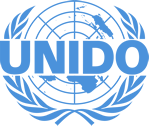 | UNIDO | United Nations Industrial Development Organization | Vienna | Jobs |
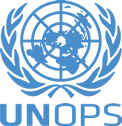 | UNOPS | United Nations Office for Project Services | Copenhagen | Jobs |
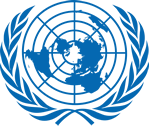 | UNOV | United Nations Office at Vienna | Vienna | Jobs |
 | UNRWA | United Nations Relief and Works Agency for Palestine Refugees in the Near East | Gaza | Jobs |
 | UNSSC | United Nations System Staff College | Torino | Jobs |
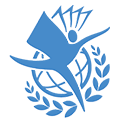 | UNITAR | United Nations Institute for Training and Research | Geneva | Jobs |
 | UNU | United Nations University | Tokyo | Jobs |
 | UNWOMEN | United Nations Entity for Gender Equality and the Empowerment of Women | New York | Jobs |
 | UNWTO | World Tourism Organization | Madrid | Jobs |
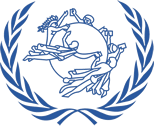 | UPU | Universal Postal Union | Bern | Jobs |
 | WFP | World Food Programme | Rome | Jobs |
 | WHO | World Health Organization | Geneva | Jobs |
 | WIPO | World Intellectual Property Organization | Geneva | Jobs |
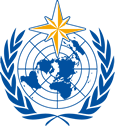 | WMO | World Meteorological Organization | Geneva | Jobs |
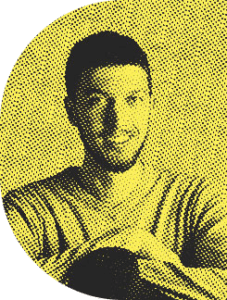
Cédric Fettouche
Cédric Fettouche works as a design strategist for the European Commission on the New European Bauhaus Initiative.
After three years of humanitarian experience in Greece and Central Mediterranean, he founded the NGO Humanitarian Designers (HD) in 2021 to bridge the gap between the design and humanitarian sectors.
Passionate about design and societal challenges, he strives to experiment his committed vision into new sectors, and share his learnings back to the design communities. You can contact him on Linkedin or on the HD Slack.
